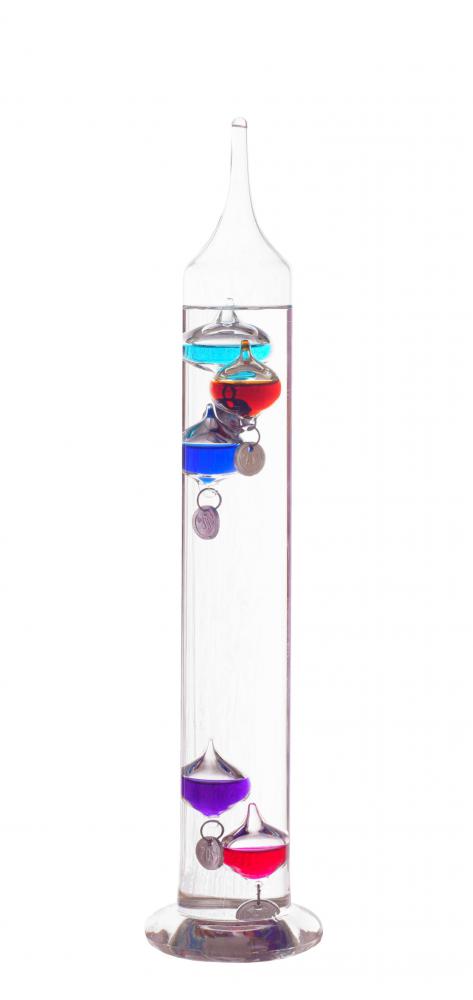What is a Galileo Thermometer?
 Mary McMahon
Mary McMahon
A Galileo thermometer is a very simple and surprisingly accurate thermometer named after Galileo Galilei, a noted 16th century scientist. While these thermometers are primarily kept around as novelty items, they can also be utilized as functional measures of the temperature. They also provide teaching opportunities, for those with young children who are just beginning to learn about the sciences.
The design of a Galileo thermometer includes a sealed glass tube, filled with liquid and a series of weights. As the temperature changes, the liquid changes density, causing the weights to rise or fall in the tube. Classically, a cluster of weights which are less dense than the liquid float near the top of the tube, while the denser weights sink to the bottom. The temperature is read by looking for the band between the two sets of weights, and averaging the temperature of the weights on either side of the band. Sometimes, a single weight will be suspended in the middle of the band, and this weight reflects the current temperature.

In the most basic form, the Galileo thermometer simply has weights with attached metal discs indicating the temperature. Many manufacturers, however, attach the weights to glass bubbles which may be brightly colored. The bubbles are calibrated so that they all have the same density, ensuring that they act purely ornamentally, and do not influence the operation of the thermometer. Objects other than glass bubbles can also be used as ornaments in the thermometer.

The very simplistic design takes advantage of the property of buoyancy, and if the weights are calibrated properly, the temperature readings can be extremely accurate. Those who are curious about the accuracy of a Galileo thermometer can compare its performance with another type of thermometer to determine how well the weights were made. The differences between the weights need to be extremely subtle, which can make errors glaringly obvious.

This type of thermometer can be used indoors or outdoors, and may be suspended in a frame or mounted on a block which allows it to sit on a table. Because it reads the ambient temperature which immediately surrounds it, it is important to think about placement. If it is placed in the sun, for example, the fluid will heat up, causing the thermometer to register a very high temperature. Likewise, placing the Galileo thermometer next to a stove or in a very cold area of the house will result in a skewed reading.
AS FEATURED ON:
AS FEATURED ON:













Discussion Comments
I was looking for a unique gift for my Dad and bought him a Galileo thermometer and barometer for his desk.
He has really enjoyed this gift and says it is a great conversation starter at work. The thermometer has the colorful liquid spheres that go up or down depending on the changes in the atmosphere.
Sitting next to that is a glass globe barometer that looks really sharp. He said he was surprised at how accurate the thermometer is.
The temperature does not change much in his office, but he can tell if a big change is coming by the changes in both the thermometer and barometer.
@golf07 - I have an outdoor Galileo thermometer, and it is not very accurate when it comes to the temperature.
I live in Florida, and have this in the shade, so the sun is not directly shining on it. Even then, the temperature always seem to show warmer than it really is.
One thing I can say about though, is that it seems to be consistent. It is usually consistently about 5-8 degrees warmer than the actual temperature.
Since I know that, I just take it in to consideration when I look at it. I love the design of this thermometer, so still enjoy it and would buy another one if this one broke.
The Galileo outdoor thermometers are more expensive than the indoor ones, but I am more interested in the outdoor temperature than I am inside the house.
I have always been fascinated with the look of these Galileo glass thermometers, but wonder if they are very accurate?
I know I can look at my phone or computer any time to know what the outside temperature is, but thought it would be neat to have one of these outdoor thermometers outside my kitchen window.
Since I love things that not only look nice, but are also functional, I was wondering if I would be disappointed in how well it measured what the temperature was.
My roommate in college had a Galileo thermometer that her parents gave her as a gift. She was studying physics and chemistry and really was interested in Galileo Galilei, both his thermometer and other inventions and discoveries he made. I think something like this would be a great gift if you know someone who is likewise interested in science, or history, or both.
Please post such articles with an illustration or photograph.
Post your comments